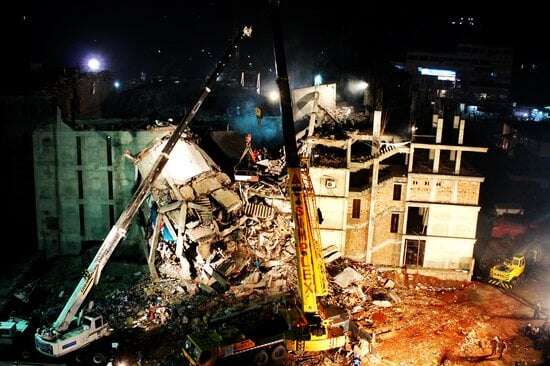In an era of disco and punk fashions, Diana Vreeland, famous fashion columnist and former Vogue editor stated: "Fashion is part of the daily air and it changes all the time, with all the events. You can even see the approaching of a revolution in clothes." This observation was astute in the 1970s, and still rings true now.
During the last decade the fashion industry is undergoing an ethical revolution, with consumers demanding transparency on where their clothes came from, who made them, how those people live, and the environmental impacts of the fashion industry on the planet. Supply chain management in the apparel industry needs to keep up with the times, and promote ethical standards for every step of the fashion garment industry. Our customers are the epitome of that change.
2014 saw the first ever Fashion Revolution Day, an event which aimed to ask the public, “who made your clothes?” This awareness day has now become an awareness week, held in April every year around the anniversary of the day the Rana Plaza building in Bangladesh collapsed. Eight years on and consumer awareness is growing around the need for a sustainable and ethical clothing industry. Elle Magazine dedicated its Sept 2018 issue to fashion sustainability and found that "62% [of readers surveyed] are more likely to buy an item of clothing from a brand that values sustainability". And yet it is so difficult for shoppers to find credible information about the working conditions and environmental impacts behind what we buy.
Why shopping has become ‘dehumanised’
Ethical Fashion Forum board member Clare Lissaman stated that the success of sustainable fashion faces a major roadblock, in that, “we dehumanise our supply chain”. Globalisation has reached such a level that we do not always consider where the items we buy have come from, and under what conditions they were produced. As we endure the slow recovery from the global financial downturn, we’ve become used to hunting for bargains, but often fail to explore the true costs of cheap clothing.
However, ethics is becoming a major issue in the garment industry, and buyers on the high street today are showing concerns about their impact on garment factory workers in developing nations.
Time for Change

The Rana Plaza factory collapse
In January 2014, the struggle for fair working conditions in the apparel industry reached the media, when police in Phnom Penh, Cambodia, opened fire on factory workers protesting for wage increases. Research by NPO Labour Behind the Label showed that many Cambodian textile factory workers were seriously malnourished as a direct result of their low pay. Naturally, there were strong public reactions to this story, and people power can have a direct result on supply chain ethics.
April 2013 saw the collapse of Rana Plaza, a garment factory in Bangladesh, due to indefensible structural failures. The immediate result of this tragedy was over 1000 deaths, but the ensuing global public outcry did later lead to more positive consequences. The Bangladesh Fire and Building Safety Accord was consequentially set up as a legally binding agreement with aims to maintain minimum safety standards in the Bangladesh textile industry, “in which no worker needs to fear fires, building collapses, or other accidents that could be prevented with reasonable health and safety measures.”
High street fashion behemoth H&M was the first major signatory, and over 100 retailers including Adidas, Abercrombie & Fitch, John Lewis and Debenhams have since followed suit. By October 2013, 1,600 Bangladeshi factories, representing around a third of the Bangladeshi textile industry, came under the care of this agreement. It is estimated that the total cost of the accord may be $1 billion, but with customers increasingly scrutinising the ethical reputation of companies, this price will be justified in order to achieve better brand transparency, not to mention better lives for millions of labourers.
Ethical Business Models
On the other side of the world, different changes are taking place in the apparel industry. In September 2013, production started at Industrial Revolution II (IRII), a garment factory in Haiti co-founded by actor Matt Damon, with a “shared value” business model. IRII promises to pay workers at least the minimum wage, and invest 50% of profits in local community and social programmes. This represents a reaction to unjust ethical conditions, and a unique way of promoting social responsibility within business, offering a more sustainable alternative to traditional international aid programmes.
the Fashion transparency index
Since the first Fashion Revolution Day, Fashion Revolution has published six annual editions of the Fashion Transparency Index, which now includes 250 of the world’s largest fashion brands and retailers. "The Index is a tool to push and incentivise the world’s largest fashion brands to be more transparent about their social and environmental efforts." This call for transparency, plus increased governmental legislation and climate change targets, all add to the demand on fashion brands to revolutionise their approaches towards the people and places within their multi-tiered supply chain.
The Missing Link in Supply Chain Management
In order for brands to prove their commitment to ethics, they need to have transparency on every aspect of production, and this requires careful supply chain management. Production tracking tools are essential to provide this level of visibility, allowing companies to ensure ethical compliance across all facets of their supply chain. All suppliers of labels, packaging, hangers, trims and similar items on the Segura system comply with industry standards for health, safety and welfare. This enforces transparency, accountability and ethical compliance, and minimises any chances of brand damage occurring.
Find out more about Segura's cloud-based supply chain management software, and arrange a demo to see how it can help support your business's journey to complete supply chain transparency, please get in touch today.


